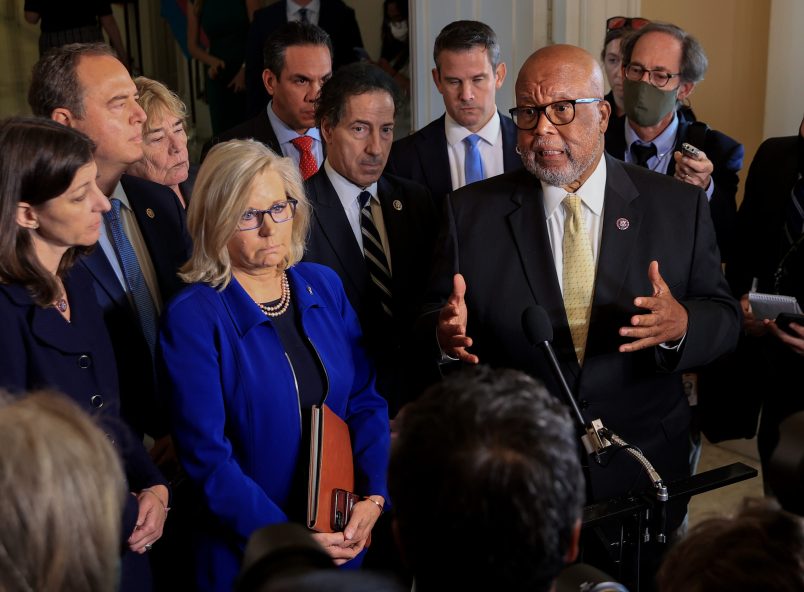Two new batches of subpoenas from the House Jan. 6 committee send a strong signal that the panel will not over-focus on the Capitol attack as an isolated event, but will instead investigate the full Trump conspiracy to subvert the 2020 election.
Other recent activities by the committee also suggest that the panel wants to probe the months of groundwork it took to create the Big Lie that the 2020 election was stolen, beginning in early 2020, and not just the insurrection itself.
“In the days before the January 6th attack, the former President’s closest allies and advisors drove a campaign of misinformation about the election and planned ways to stop the count of Electoral College votes,” panel chairman Rep. Bennie Thompson (D-MS) said in a Monday statement. “The Select Committee needs to know every detail about their efforts to overturn the election, including who they were talking to in the White House and in Congress, what connections they had with rallies that escalated into a riot, and who paid for it all.”
Former Congressional investigations staffers expressed concern to TPM this summer that the probe wouldn’t go far enough to understand the true scope of the attack – one that began with the attempt to subvert the election and continue through Jan. 6.
Monday’s subpoenas include Bill Stepien, Trump’s 2020 campaign manager, Michael Flynn, another Trump adviser who advocated for martial law in December 2020, and Bernie Kerik, a Giuliani associate reportedly involved in planning for the Jan. 6 rally on the ellipse.
On Tuesday, the panel issued another round of subpoenas, taking the investigation deeper into how the Big Lie was promoted. That includes demands for interviews and documents from former White House press secretary Kayleigh McEnany and from former senior adviser Stephen Miller, as well as a series of lower-profile aides involved in spreading the idea that the election was stolen.
The expansion comes as Trump and those who pushed the Big Lie have become more aggressive in trying to block the investigation and in asserting that they were in the right.
Jeff Clark, the former DOJ official who tried to have the department intervene in the election, stonewalled investigators on Friday. Federal prosecutors are currently reviewing whether to prosecute Steve Bannon for contempt of Congress after disobeying a committee subpoena.
Trump, who retreated from public view for a few months after he left office, reportedly told Republican lawmakers on Monday that the real “insurrection” took place on Election Day 2020, and not Jan. 6, 2021.
New subpoenas
The attack on the 2020 election results began long before Jan. 6. And, as TPM wrote in July, the crime scene extends far beyond the Capitol building.
The new subpoenas — combined with earlier moves the panel has taken — focus on the broader run-up to the insurrection.
Take the subpoenas for Stepien and Miller. The two helped take the Trump campaign from being an operation aimed at re-election to a campaign against the election itself.
Stepien helmed Trump’s 2020 campaign. Before the former president had officially lost but after voting ceased on Nov. 3, Stepien was already proclaiming a win.
“We’re declaring a victory in Pennsylvania,” Stepien told reporters on a Nov. 5, 2020 call.
In the subpoena, the committee says that Stepien “supervised the conversion of the Trump presidential campaign to an effort focused on ‘Stop the Steal’ messaging and related fundraising.” The subpoena says that the messaging included “certain false claims related to voting machines” and was repeated by those who attacked the Capitol on Jan. 6.
Miller, similarly, spent the immediate post-Election Day period describing to reporters how the campaign wouldn’t let voter fraud get in the way of what he described as an insurmountable lead.
In the weeks that followed, he reportedly worked with Trump and Rudy Giuliani to stage press conferences stating that the election was stolen — a key pathway on which the Big Lie transformed from a series of scattered fables into a cohesive narrative mainlined through the GOP bloodstream.
Lying, bigly
Others in the committee’s batch of Tuesday subpoenas also played a part in the creation of the Big Lie.
The panel wants information from a host of military-related officials, but also from key Trump administration communications and policy appointees who used their perch to promote the idea that the 2020 election was stolen.
This includes Kayleigh McEnany, the former White House press secretary, Cassidy Hutchinson, a White House special assistant who communicated with Georgia’s deputy secretary of state, and Ken Klukowski, a DOJ official who, a Senate investigation found last month, may have supported Jeff Clark’s bid to use the department against the election result.
The subpoena for Molly Michaels, Oval Office operations coordinator for Trump, says that the panel has obtained documents which “show that you were specifically involved in sending information about alleged election fraud to various individuals, apparently as the direction of President Trump.”
For McEnany and Miller, the panel is interested in the genesis of the Big Lie and how it spread.
McEnany, for example, attracted the committee’s attention in part for a Nov. 20 press conference she gave in which, the subpoena says, she stated that there are “very real claims” of fraud and that mail-in voting was “particularly prone to fraud.”
McEnany made the same claims in a November 2020 Fox News appearance, and rode the wave with Trump until the end: Jan. 6, which she watched take place from within the White House.
Similarly, Miller said publicly in December 2020 that Trump would remain in power thanks to “alternate” elector slates from competing states. That was a key factor in Big Lie cosmology which led to Jan. 6 — the idea that stopping the certification of Biden electors could eventually pave the way for Trump ones to be confirmed.






